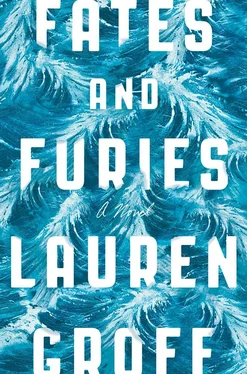Inside: a confusion. A face startlingly familiar. Handsome, dark-haired, smiling. With each successive page, the face grew younger until it was a red, wrinkled baby asleep in hospital blankets.
An adoption certificate.
A birth certificate. Satterwhite, Roland, born July 9, 1984. Mother: Watson, Gwendolyn, aged 17. Father: Satterwhite, Lancelot, aged 15.
Mathilde dropped the book.
[A puzzle she’d thought she’d solved revealed itself to go endlessly on.]
MATHILDE HAD ALWAYS BEEN a fist, in truth. Only with Lotto had she been an open hand.
—
SAME NIGHT; ROTTING TOMATOES. Sallie’s perfume lingered, though she and Rachel were dreaming drunkly in the guest rooms above. In the window, a paring of moon. Bottle of wine, kitchen table, dog snoring. Before Mathilde, an expanse of white paper, easy as a child’s cheeks. [Write it, Mathilde. Understand.]
Florida, she wrote. Summer. 1980s. Outside, sun blaze unbearable over the ocean. Inside, carpets in beige. Popcorn ceilings. Potholders in the olive kitchen silkscreened with the lewd shape of Florida, mermaids on the left, rockets on the right. Naugahyde recliners; a bestiary of modern American life flashing on the television. Floating alone in the hot cave of the house: a boy and a girl. Twins, barely fifteen. Charles, called Chollie; Gwendolyn, called Gwennie.
[Odd, how easy it all is to summon. Like a pain from a dream. A life you’d imagined so long that it had almost become a memory; this middle-class American childhood of the eighties that you’d never had.]
In her room, the girl rubbed Vaseline on her lips, face blooming white breath in the mirror.
She would emerge in pink pajamas when the father came home, her wild curly hair in two braids, and warm up the dinner she’d saved for him, some chicken and a boiled vegetable. She’d yawn and pretend sleep. Keeping their father company in the kitchen, her brother would imagine the metamorphosis inside his sister’s bedroom: legs peeled, pale in the miniskirt, eyes darkened with makeup. A strange creature, so different from the sister he knew, breaching into the night through the window.
Her nighttime changes were not despite the fear; they were about it. Small even for a fifteen-year-old, she could have been held down by any passing boy. A refutation of the girl who had already studied calculus, who had won science fairs by building her own robots. She went shivering down the dark streets, toward the convenience store, feeling acutely the untouched place under her skirt. She walked it down the aisles. Burt Bacharach; the cashier watching her with open mouth, skin piebald with vitiligo. Man in a white jumpsuit, watching her in the soda section, jangling the change in his pocket. Get me one a those, he ordered, but about the greasy spinning hot dog. Under the angry moth light outside, three or four kids were flipping their skateboards. She didn’t know them. They were older, college-aged though she doubted — greasy hair, baja hoodies — they were in college. She stood by the pay phone, dipping her finger in and out of the coin slot. No change, no change, no change. Slowly, one came closer. Bright blue eyes under a monobrow.
Debatable how long the seduction took. The smarter the girl, the swifter these things go. Physical forwardness as intellectual highwire act: the pleasure not of pleasure but of performance and revenge against the retainer, the flute, the stack of expectations. Sex as rebellion against the way things should be. [Sounds familiar? It is. No story on earth more common.]
For nearly a year, a besotment of fingers and tongues. Out the window in the dark she went, again and again; and school came and debate team and band practice. Slow solidification beneath the ribs like rubber cement exposed to air. The body knows what the brain refutes. She wasn’t dumb. That year she was lucky in fashion: sweatshirts worn huge, to the knees. The mother came home late on Christmas Eve. The girl came out on Christmas morning in her flannel nightgown and the mother turned, singing. She saw her daughter, the bulge at the waist, and dropped the monkey bread she’d been making.
The girl was taken to a cool place. Nobody was unkind. Her insides were scrubbed. Voices soft. She left, not the same girl as she’d been when she went in.
[The lives of others come together in fragments. A light shining off a separate story can illuminate what had remained dark. Brains are miraculous; humans storytelling creatures. The shards draw themselves together and make something whole.]
The twins turned sixteen in the spring. There were the new locks outside her door, on the windows. Her brother suddenly three inches taller than she. He began to follow her around, a goofy-looking shadow. “Play Monopoly?” he’d say, as she crossed through the room one of the dull Saturday nights. “Don’t worry about me,” she said. She was grounded, she had to murmur to the skateboarding boys who hung around the school gates waiting, to the girls she’d known since kindergarten, who’d wanted her to join them watching The Dark Crystal and eating Jiffy Pop and crimping their hair. She was always more popular than her twin, but soon a whiff of sex sullied her. She had only her brother. Then Michael.
—
MICHAEL WAS BEAUTIFUL, half Japanese, tall and dreamy with a fashionable slab of black hair over one eye. In class, Gwennie had spent weeks surreptitiously imagining her tongue licking the pale skin of his inner wrist. He dreamt of boys; Gwennie dreamt of him. Chollie liked him grudgingly; her brother required absolutes: loyalty, generosity, things Michael couldn’t give. But the marijuana he shared relaxed Chollie enough to make him begin to crack jokes, to smile. So it passed until the end of school. Her mother in San Diego, Milwaukee, Binghamton; she was a traveling nurse who took care of babies almost too tender to survive.
They met Lotto. Painfully tall, face blitzed with acne, his sweet boy’s heart. Summer stretched out before them: different drugs, beer, huffing glue, all fair game as long as the twins were home for dinner. Gwennie was the center of this circle; the boys spun around her, satellites.
[Such a brief time, this ménage à quatre. Only all summer tipping into October, but it changed everything.]
On the crenellations of the old Spanish fort, they did whippets with stolen cans. St. Augustine with its herds of tourists shining below. Michael sunbathed, twitching to the music from the tape deck, the glorious smoothness of that body. Lotto and Chollie were in deep conversation as usual. The sea below winking light. She needed them to look at her. She stood on her hands at the edge of the fort, a forty-foot drop into death. She’d done gymnastics until her body turned traitor with boobs; she held the pose. From upside down, their faces against the blue, her brother standing up in fear. She came down and almost passed out from blood to the brain, but sat. The pulse so loud in her ears she didn’t hear what he was saying, just waved her hand, and said, “Chill the fuck out, Choll. I know what I’m doing.”
Lotto laughed. Michael’s abs flexing to look at Lotto. Gwennie looking at the abs.
In early October, they spent a Saturday on the beach. Their father had begun trusting her again, or trusting Chollie to keep her in line, and had flown off to Sacramento to be with their mother for the weekend. Two free days like an open mouth. They drank beer all day in the sun and passed out, and when she woke, she was burnt all over and it was sunset and Lotto had started building something enormous with sand, already four feet high and ten feet long and pointing toward the sea. Woozy, standing, she asked what it was. He said, “Spiral jetty.” She said, “In sand?” He smiled and said, “That’s its beauty.” A moment in her bursting open, expanding. She looked at him. She hadn’t seen it before, but there was something special here. She wanted to tunnel inside him to understand what it was. There was a light under the shyness and youth. A sweetness. A sudden surge of the old hunger in her to take a part of him into her and make him briefly hers.
Читать дальше












